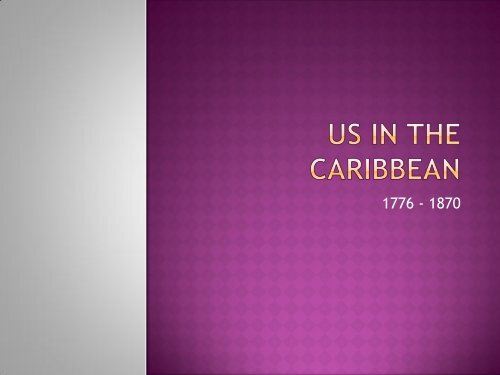US in the Caribbean
US in the Caribbean
US in the Caribbean
You also want an ePaper? Increase the reach of your titles
YUMPU automatically turns print PDFs into web optimized ePapers that Google loves.
1776 - 1870
Watch <strong>the</strong> video<br />
Write a short (2 m<strong>in</strong>ute-)commentary on <strong>the</strong><br />
clip giv<strong>in</strong>g <strong>the</strong> reason stated by <strong>the</strong><br />
songwriter why Lat<strong>in</strong> Americans (and<br />
<strong>Caribbean</strong> people) often oppose <strong>US</strong><br />
<strong>in</strong>tervention.<br />
State whe<strong>the</strong>r you agree with his position.<br />
Tiburón (shark)<br />
lyrics
Remember <strong>the</strong> research questions. Which factors<br />
were most important <strong>in</strong> each <strong>US</strong> <strong>in</strong>tervention:<br />
economic, political (<strong>in</strong>clud<strong>in</strong>g strategic/defence)<br />
or ideological?<br />
Were <strong>the</strong> actions taken to do with:<br />
Defence<br />
Expansionism<br />
Trade and <strong>in</strong>vestments (economic factors)<br />
Ideology?<br />
Both of <strong>the</strong>se are<br />
political factors
Assess <strong>the</strong> reasons for <strong>US</strong> <strong>in</strong>terest <strong>in</strong> <strong>the</strong><br />
<strong>Caribbean</strong> 1776-1870<br />
Decide which of <strong>the</strong> follow<strong>in</strong>g factors were<br />
important:<br />
Defence<br />
Expansionism<br />
Trade and <strong>in</strong>vestments (economic factors)<br />
ideology
key events<br />
American Independence 1776<br />
Lat<strong>in</strong> American Independence.<br />
Monroe Doctr<strong>in</strong>e 1823<br />
Manifest Dest<strong>in</strong>y<br />
Desire for a canal<br />
Grow<strong>in</strong>g <strong>in</strong>terest <strong>in</strong> Cuba<br />
<strong>US</strong> economic expansion after Civil War
1776 to 1870<br />
Use for reference when review<strong>in</strong>g today’s<br />
work to help you understand <strong>the</strong> “whole<br />
picture” of this period.
American Independence 1776. ended trade<br />
relationship between two sets of colonies. <strong>US</strong> could<br />
not legally trade with <strong>the</strong> British <strong>Caribbean</strong>.<br />
Struggle with Brita<strong>in</strong> over markets <strong>in</strong> <strong>the</strong> <strong>Caribbean</strong><br />
and o<strong>the</strong>r issues. War of 1812-1814, free trade<br />
agreements 1830. Interest <strong>in</strong> <strong>Caribbean</strong> is ma<strong>in</strong>ly<br />
economic.<br />
Lat<strong>in</strong> American Independence. <strong>US</strong> concerns are<br />
economic (keep<strong>in</strong>g markets) and ideological<br />
(support<strong>in</strong>g <strong>in</strong>dependence of Lat<strong>in</strong> American<br />
Countries).
Simon Bolivar (1783-1830) was<br />
one of South America's<br />
greatest generals.<br />
His victories over <strong>the</strong><br />
Spaniards won <strong>in</strong>dependence<br />
for Bolivia, Panama,<br />
Colombia, Ecuador, Peru, and<br />
Venezuela.<br />
He is called El Liberator (The<br />
Liberator) and <strong>the</strong> "George<br />
Wash<strong>in</strong>gton of South America."<br />
http://www.bolivarmo.com/hi<br />
story.htm
Monroe Doctr<strong>in</strong>e 1823 said “Europe must not<br />
<strong>in</strong>tervene <strong>in</strong> Lat<strong>in</strong> America and <strong>the</strong> <strong>Caribbean</strong>”<br />
Video<br />
Writ<strong>in</strong>g exercise:
What was <strong>the</strong> ma<strong>in</strong> reason for <strong>the</strong><br />
declaration of <strong>the</strong> Monroe Doctr<strong>in</strong>e?<br />
Was this reason economic, political, strategic<br />
or ideological?<br />
How might it have affected <strong>the</strong> island<br />
territories of <strong>the</strong> <strong>Caribbean</strong>? Remember: <strong>in</strong><br />
1823 only Haiti and <strong>the</strong> Dom<strong>in</strong>ican Republic<br />
were <strong>in</strong>dependent.
Brita<strong>in</strong> did not accept <strong>the</strong> Monroe Doctr<strong>in</strong>e. Had<br />
own <strong>in</strong>terests <strong>in</strong> <strong>the</strong> <strong>Caribbean</strong>.<br />
Manifest Dest<strong>in</strong>y—(Mexican American war 1846)<br />
Ideology affect<strong>in</strong>g <strong>US</strong> attitude towards expansion.<br />
Rem<strong>in</strong>der<br />
Desire for a canal...
http://www.econedl<strong>in</strong>k.org/lessons/images_lessons/719_1914_panama_<br />
canal.GIF1.gif
Wrangl<strong>in</strong>g with Brita<strong>in</strong> over Central<br />
America (wanted a canal) Clayton-<br />
Bulwer Treaty 1850. Concerns are<br />
economic and strategic (political)
Assess <strong>the</strong> factors:<br />
Zachary Taylor’s secretary of state, John M. Clayton, met with a<br />
British representative, Sir Henry Bulwer, to calm a potentially<br />
troublesome issue <strong>in</strong> Central America. Both powers had studied<br />
<strong>the</strong> feasibility of construct<strong>in</strong>g a canal to l<strong>in</strong>k <strong>the</strong> Atlantic and<br />
Pacific oceans through <strong>the</strong> narrow isthmus <strong>in</strong> Central America.<br />
Initially <strong>the</strong> most promis<strong>in</strong>g site appeared to be <strong>in</strong> Nicaragua.<br />
Nei<strong>the</strong>r party was prepared <strong>in</strong> 1850 to undertake <strong>the</strong> massive<br />
project, but wanted to ensure that one country would not act <strong>in</strong><br />
<strong>the</strong> absence of <strong>the</strong> o<strong>the</strong>r.<br />
Under <strong>the</strong> terms of <strong>the</strong> Clayton-Bulwer Treaty, <strong>the</strong> two parties<br />
agreed:<br />
Not to seek exclusive control of <strong>the</strong> canal or territory on ei<strong>the</strong>r<br />
side of such a canal<br />
Not to fortify any position <strong>in</strong> <strong>the</strong> canal area<br />
Not to establish colonies <strong>in</strong> Central America<br />
http://www.u-s-history.com/pages/h344.html
Grow<strong>in</strong>g <strong>in</strong>terest <strong>in</strong> Cuba: attractive for many<br />
reasons: economic (markets, <strong>in</strong>vestments),<br />
strategic and defensive (position of Cuba), political<br />
(slavery)<br />
<strong>US</strong> Civil War 1861-1865. slavery ends.<br />
<strong>US</strong> economic expansion after Civil War. More<br />
bus<strong>in</strong>esses search for places to <strong>in</strong>vest and sell<br />
goods. Control over trade of DR, PR, Haiti, San<br />
Salvador, Guatemala and Honduras (p. 172)
Surge <strong>in</strong> European imperialism, <strong>US</strong> gets <strong>in</strong>terested<br />
<strong>in</strong> imperialism: colonies and possessions <strong>in</strong> Pacific<br />
e.g. 1880s<br />
Cuban struggle for <strong>in</strong>dependence José Martí 1895.<br />
<strong>US</strong> support—economic, ideological. Cruelly<br />
suppressed.<br />
Spanish American War—student presentations<br />
beg<strong>in</strong>.
Video<br />
http://www.besthistorysites.net/ushistory_earlyimperialis<br />
m.shtml OR http://www.history.com/videos/rooseveltfights-<strong>in</strong>-spanish-american-war#roosevelt-fights-<strong>in</strong>spanish-american-war
http://www.smplanet.com/imperialism/toc.<br />
html


